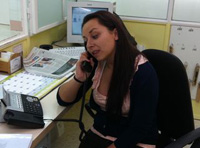ETIQUETTE AT THE OFFICE.- Communicative activities.

Read the text and listen to the situation.
The girls are back in the office and Lourdes receives a phone call.
Lourdes: Hello? Lourdes speaking.
Michael: Hi Lourdes! It's Michael. How are you?
Lourdes: I'm fine, thanks. How are you? How are things with your girlfriend?
Michael: I'm great. I followed your advice and thinks have worked out perfectly. My girlfriend and I make up.
Lourdes: Wow, that's fantastic news. I'm really happy for you.
Michael: Yes, thank you. I have to go now. Talk to you later.
Lourdes: Bye.
Lourdes can't wait to tell Susana about the good news and phones her.
Susana: Hey, that's wonderful. You know, we are very good at giving advice.
Lourdes: Yes, and we are experts in good manners and etiquette.
Susana: That's right. I'm so happy we came to London. We're learning so much!!!
What have you learned in this unit? Can you...?
- Apologise to somebody.
- Express ability.
- Give permission.
- Make deductions.
- Follow the rules of etiquette at the office.
- Express reason and result.
- Express obligation.
- Write a memo.
- Pronounce modal verbs.
- Tell the difference between an adjective and an adverb.

1.- Reading exercise.

Let's read the following text to find out about manners nowadays.
Many people lament the lack of good manners in today's society. There tends to be a "me first" attitude that can manifest itself in rudeness and bad manners. Some people focus on their own needs and forget about treating others with respect. If you treat people with respect, from potential partners to bosses to total strangers, and make a good impression, there could be some tangible benefits.
Workplace.
Using good manners on the job will give a good impression to your co-workers and bosses. It can be hard to stand out at work when you have the same skills and ability level as everyone else on your work team. Good manners can set you apart, helping you to earn recognition and possible raises and promotions.
Customers.
If you deal with customers, good manners can help you maintain your current clients and win new customers more easily. In a study by Eticon Inc., an etiquette consulting company, 58 percent of people surveyed said they would stop dealing with a business if they were treated rudely. Using good manners also can bring down hostility and defensiveness when a customer comes to you with a problem.
Drivers.
Try to maintain good manners on the road, even when other drivers do foolish things like cutting you off. By maintaining good manners, you'll reduce your own stress level and reduce the chance that another driver will try to get into a violent confrontation with you.
Everyday contacts.
Use good manners and treat others with respect, even if they are everyday contacts who you do not know personally. This includes store clerks, gas station attendants, salespeople and just about anyone else you might encounter in your daily routine. If you treat others with respect, they are more likely to respond in the same way. If you end up having a problem, they will be more likely to go out of their way to help you if you use good manners instead of getting upset. Using good manners with a stranger can brighten the other person's day, even with a simple act like holding a door open or giving up your seat on a crowded train.
Text adapted from http://www.ehow.com/about_5368297_benefits-good-manners.html
| Sentences | Match | Paragraph |
|---|---|---|
| Give up your seat. | 1. Workplace. | |
| Good manners help you reduce stress. | 2. Customers. | |
| Good manners can impress your boss. | 3. Drivers. | |
| Use good manners with strangers. | 4. Everyday contacts. | |
| If people are treated rudely, they stop dealing with a business. | ||
| Good manners can help you to get a promotion. |
2.- Listening exercise.

Listen to an expert discussing covering letters and then do the exercise below.
Complete the text with the missing words.
Do
matter at work? Should you really be expected to be
all the time, or can you bend the rules in the name of efficiency or self-preservation?
When your boss calls and you're in the
of a meeting with a colleague, you answer it. It must be important – after all, it's your boss! Never mind that your colleague and the meeting are important too, it's your boss on the phone!
Or what about when you're behind? It's 3:50 pm and the report you're preparing has to be printed by 4:00 pm sharp. You print it off and the paper in the middle of your job. There's no time to fix it so you resend the print job to another printer and you just leave the jam for someone else to discover and fix. Sure, it's an for them, but it wasn't exactly your fault that the printer jammed, was it?
You know that behaviors like this are . You wouldn't behave in this way outside of the office. So why do we then ourselves to behave inconsiderately at work?
behavior makes members of your team unhappy. With this in mind, there is simply no for bad manners.
Text adapted from http://www.mindtools.com/pages/article/newCDV_82.htm
3.- Speaking exercise.

Answer the following questions:
- Where and when do you usually switch off your mobile?
- Have you ever forgotten to turn your phone off? Were there embarrassing consequences?
- Do you use more formal language when you speak to an older person / your boss / a teacher?
- Do you always stop at a pedestrian crossing?
- When you arrive more than 15 minutes late for a lunch or dinner at someone's house, do you apologise? Do you take a present?
4.- Writing exercise.
Write memos with the following information.
Example: Mrs Harris / Peter Duncan / application forms for course / send back asap.

To: Mrs Harris.
From: Peter Duncan.
Attached you will find the application form for the course. Could you complete it and send it back as soon as possible?
- Mr Reynolds / Susan Fleming / inform the workers about new schedules / attached document with more information.
- Ms Branson / Anne Smith / pick up the package at the train station / bring it to office asap.
- Mr Brown / Susan Ford / in response to memo / gave details to administration staff to start working on the new campaign / attached document with new brochures.
Appendix.- Licenses of resources.
| Resource (1) | Resource information (1) | Resource (2) | Resource information (2) |
|---|---|---|---|
 |
By: Lady_K. License: CC by-nc-sa 2.0. From: http://www.flickr.com/photos/krista_g/2386400492/ |
 |
By: Marcin Wichary. License: CC by 2.0. From: http://www.flickr.com/photos/mwichary/2132379434/ |
 |
By: sean dreilinger. License: CC by-nc-sa 2.0. From: http://www.flickr.com/photos/seandreilinger/5208697698/ |
 |
By: Shawn Econo. License: CC by-nc-sa 2.0. From: http://www.flickr.com/photos/shawnecono/145424142/ |